The growing difficulty for Canadians in dealing with today’s realities

The surprise from national polling in the last few months is definitely the rise of the Conservative Party of Canada (CPC) in the voting intentions at the federal level. So much so that the 338Canada project – a statistical model of electoral projections based on opinion polls, electoral history, and demographic data – presents a very plausible scenario (based on the website’s October 15 update) that the CPC could form a majority government after the next election.
After watching Pierre Poilievre put forward a populist political agenda, publicly sympathize with truckers during the crisis in Ottawa in February 2022, demand that the governor of the Bank of Canada be fired, promote cryptocurrencies, and even promise to ease restrictions on the oil and gas industry, we are now facing the real possibility that the CPC could form the next government in Ottawa, and with majority to boot!
After the question What does Quebec want?, it’s now time to ask ourselves What does Canada want?
Putting Canadians back in control of their lives!
One of the key themes in Mr. Poilievre’s speeches is that Canadians have lost control over their lives. And he lays the blame squarely on the Liberal government, particularly on Mr. Trudeau, and its policies of recent years.
It is true that socio-economic and geopolitical forces beyond people's control are having a greater impact on their lives. And most of the time, these forces are more global than local in scope (climate change, food prices, energy prices, etc.).
Whether a Conservative government under Mr. Poilievre's leadership could truly return a sense of control to Canadians remains an open question.
But we have to admit that he is targeting a very sensitive hot button for Canadians.
Indeed, one of the underlying trends in Canadian society in recent years, as we have pointed out repeatedly, has been a growing sense of disempowerment. Below, one of our indicators clearly illustrates this phenomenon:
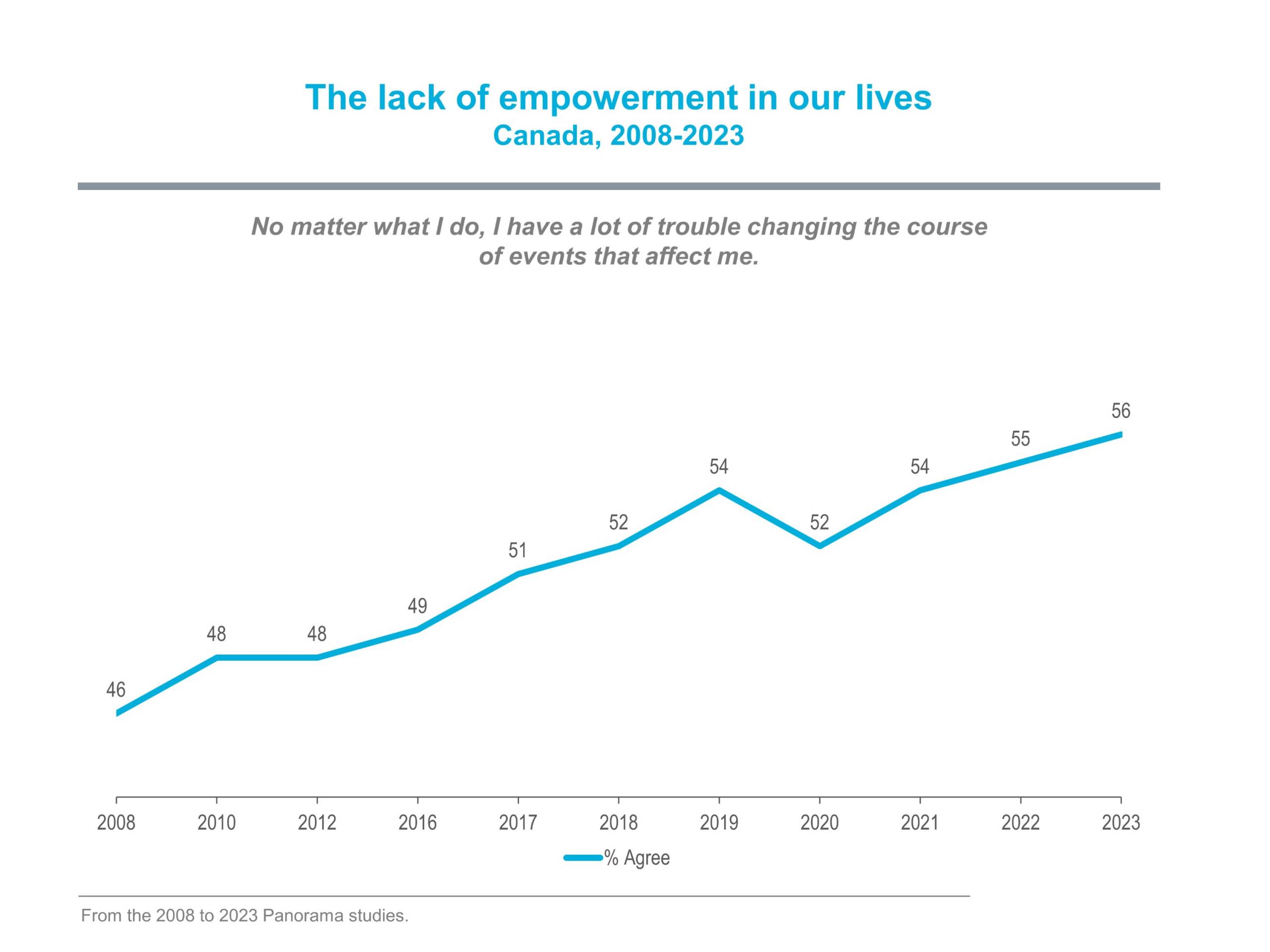
People increasingly feel that they are being throttled by constraints over which they lack control and that threaten the integrity of their lifestyle.
Mr. Poilievre has been very clever at exploiting this growing sense of powerlessness. He has become the channel of expression for Canadians who feel that they are losing their grip over their destiny!
Cynicism
Another phenomenon associated (correlated) with this trend is a loss of trust in society’s institutions and elites. A staggering number of individuals in this country espouse quite conspiratorial views with respect to the elites, as shown in the following table:
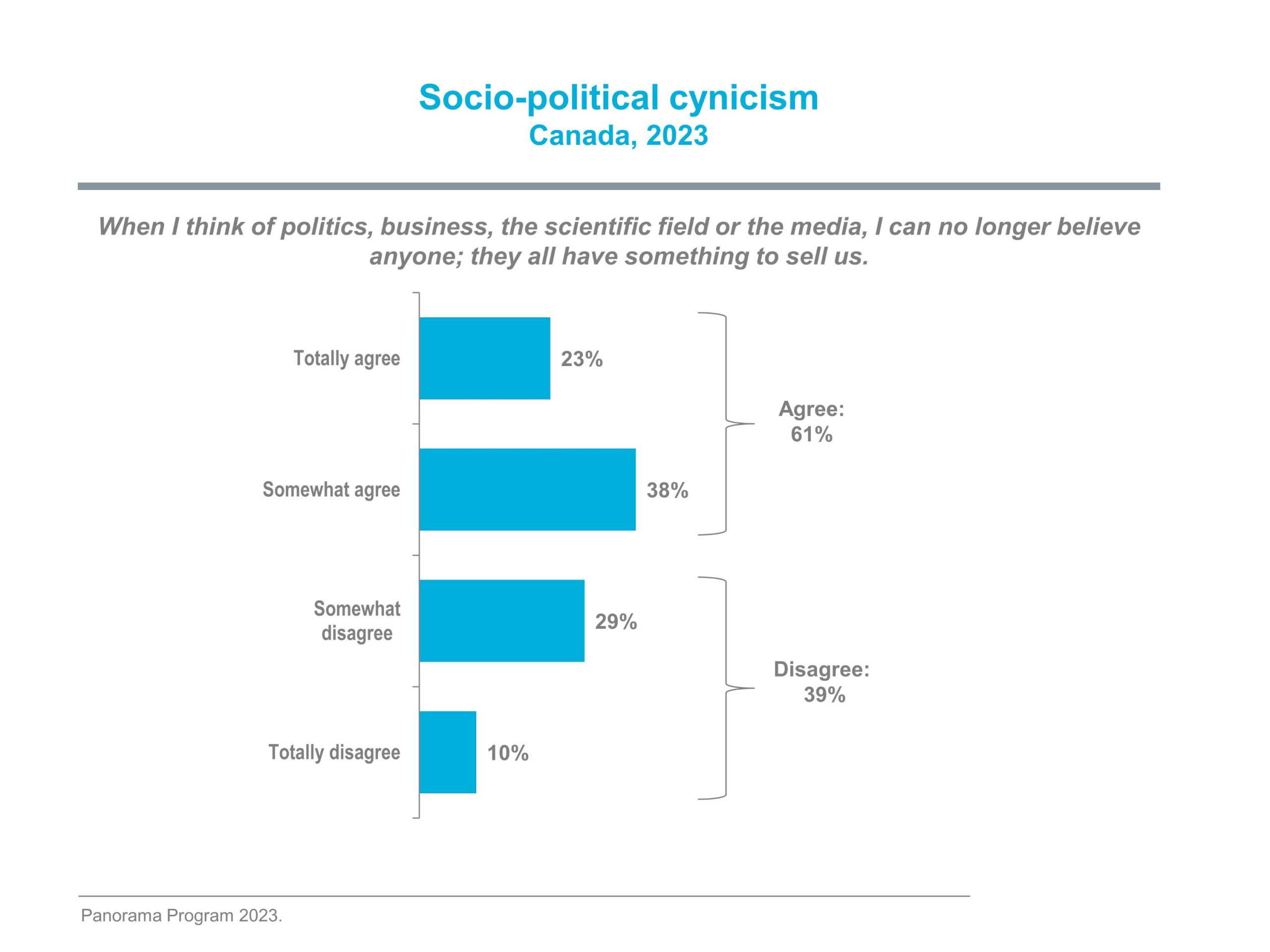
The proportion who agree with this last statement seems enormous to us. While a plurality (38%) consider themselves to be “somewhat” in agreement, overall, this view is shared by three out of five people (61%) in the country – a proportion that has continued to rise over the last 20 years.
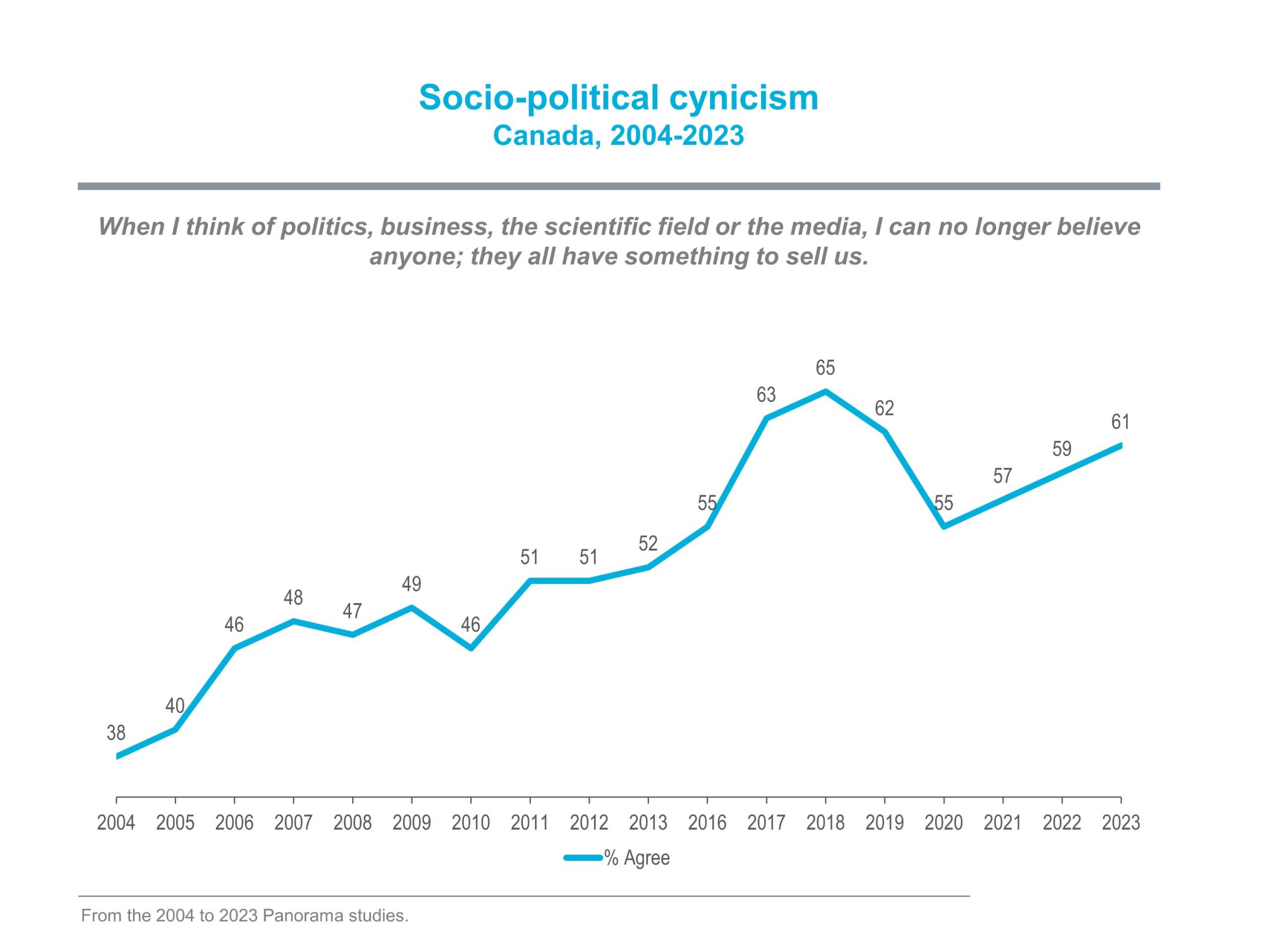
There was some respite from the upward trend at the beginning of the pandemic (2020), as people gave institutions a chance to help the country through the ordeal. But the upward trend has resumed.
Cynicism and political parties
Yet it is precisely on this trend of cynicism that the political parties with populist platforms, including the CPC, are riding.
They maintain that it is our institutions, which they accuse of corruption, that are at the root of this lack of control over our lives and that under their leadership, government would give back control, power and freedom to their fellow citizens.
And the people who vote for such parties believe it, as shown in the following table:
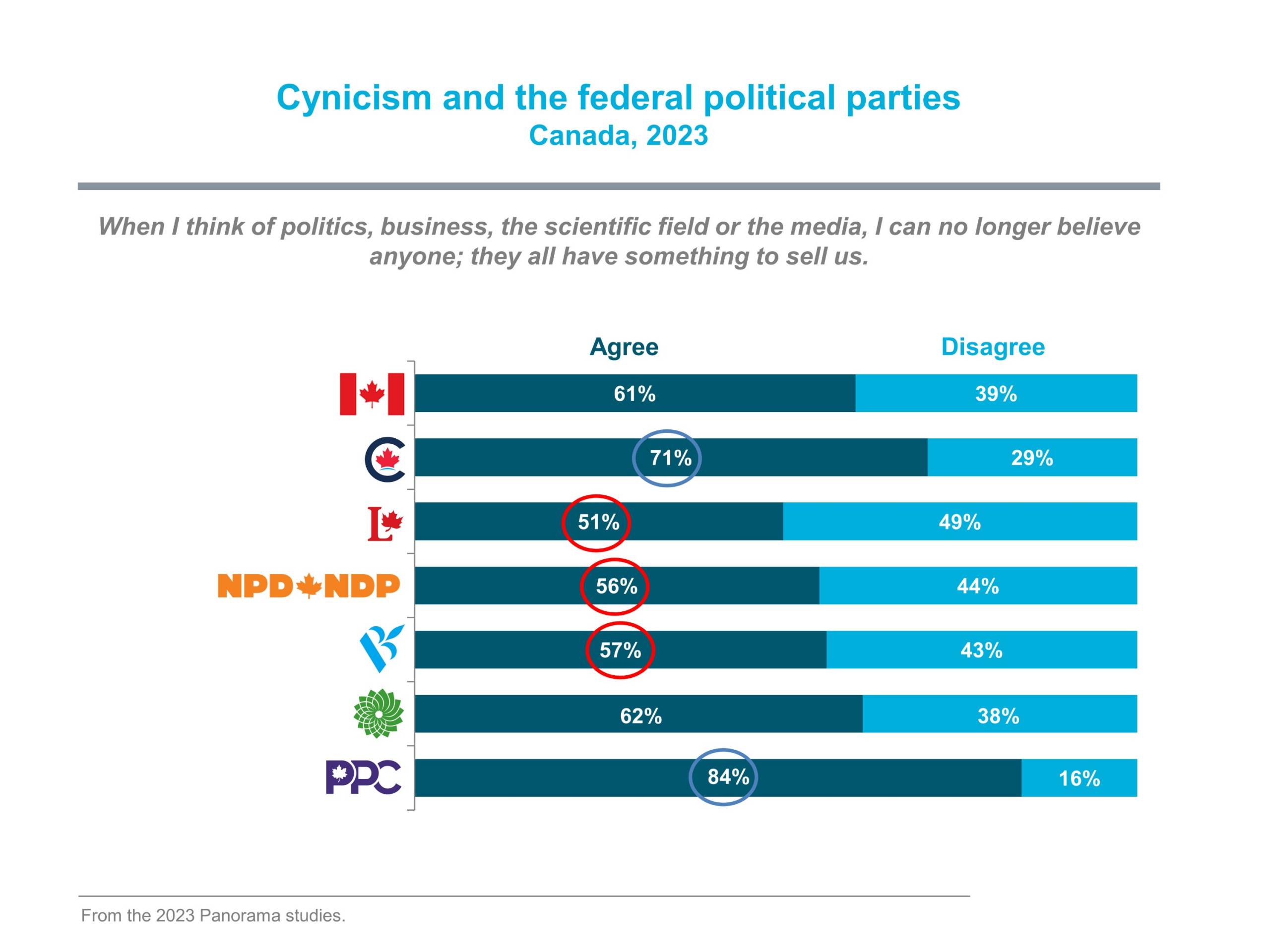
The 20-point gap between Conservative and Liberal voters is staggering: 71% for the Conservatives vs. 51% for the Liberals.
But even among Liberals, our conspiratorial statement has the support of a majority of voters (51%) – amply demonstrating the extent of the cynicism among the Canadian population.
Note: To reflect the essence of each party’s brand, we are using only data from voters who, because of their values and convictions, would vote without hesitation for their party of choice, while ignoring those who hesitate to take a position or switch from party to party depending on the issues.
It is therefore very clear that the Conservative Party (at 71%) fits in perfectly with a conspiracy movement that asserts that all our elites and institutions are concerned only with their own interests to the detriment of the public interest – a belief that aligns perfectly with this underlying trend in Canadian society.
A movement that Mr. Poilievre embodies to perfection! He has proved to be very skillful at riding this wave of resentment.
Freedom
Given this trend of cynicism in the country, the trucker crisis in Ottawa in 2022 inspired a new question to help deepen our understanding of the phenomenon – an additional dimension that also seems to be part of a rising movement. Admittedly, we need to be careful here since we are only looking at two years.
But still...
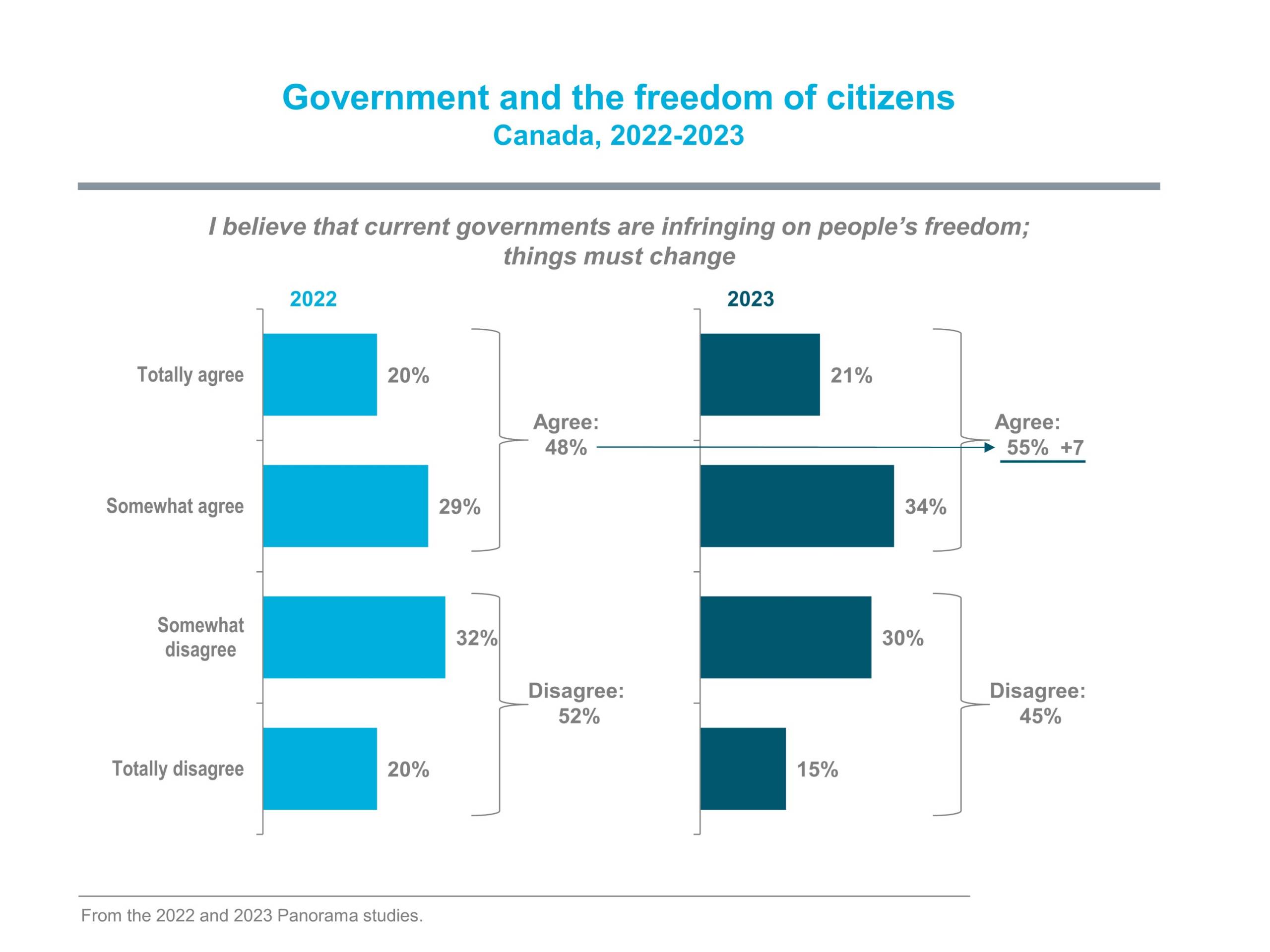
In 2023, a plurality (34%) “somewhat agree” with the statement but, overall, more than one in two (55%) are in agreement with the notion. And this percentage has risen by seven points in the last year alone!
Which to us seems huge for such an unambiguous statement!
The alignment with federal voting intentions is striking and entirely consistent with the trend described above.
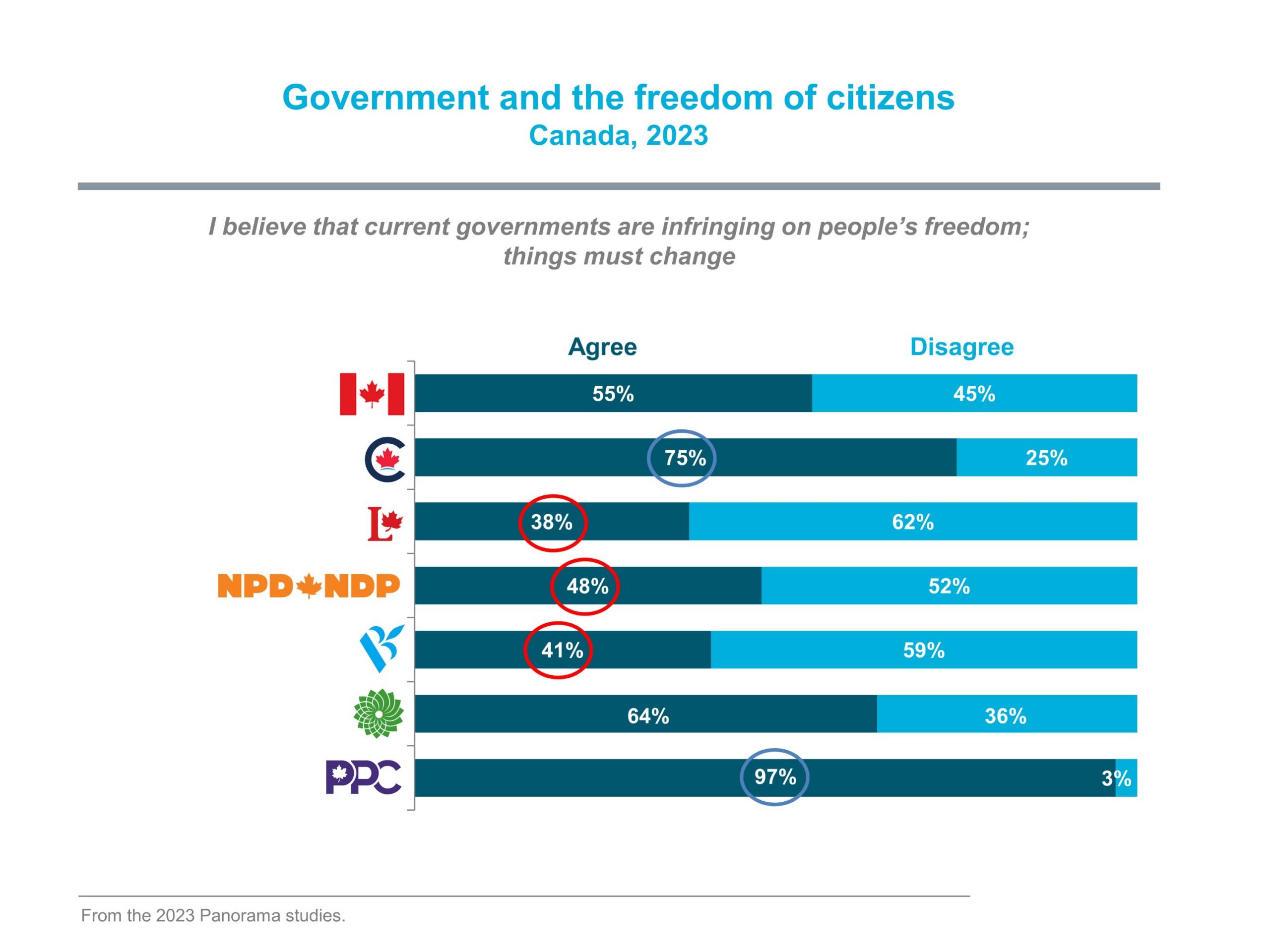
The difference from the Liberal Party is striking: a 37-point gap.
The role of government
These results represent also how Canadians view the role of government and what they expect from it: interventionist and progressive versus minimalist and conservative (in philosophical terms).
For more than 40 years, from the 1960s (Lester B. Pearson) to the 2000s (Paul Martin), the so-called Laurentian elite, embodied by the Liberal Party of Canada, led and dominated the country, forging its identity and imposing a progressive and humanist agenda. Even the Conservatives during this period promoted themselves as Progressive Conservatives!
The political consensus imposed by the Laurentian elite is clearly displayed by the difference between Québec and the rest of the country on the following question:
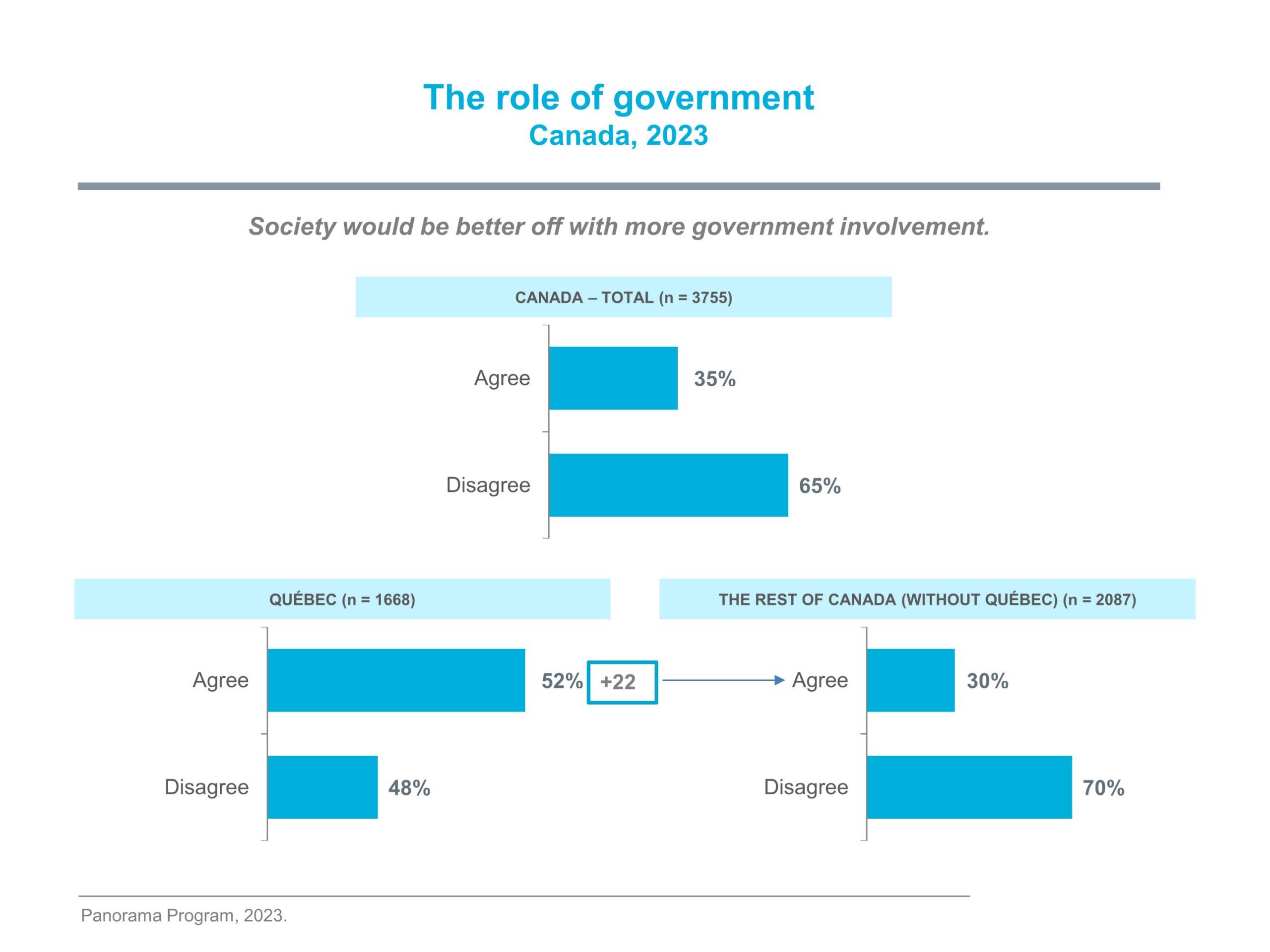
A 22-point gap between the two solitudes! A difference that is still expressed very clearly in the voting intentions for the parties and that embodies radically opposed visions for the role of the State in society:
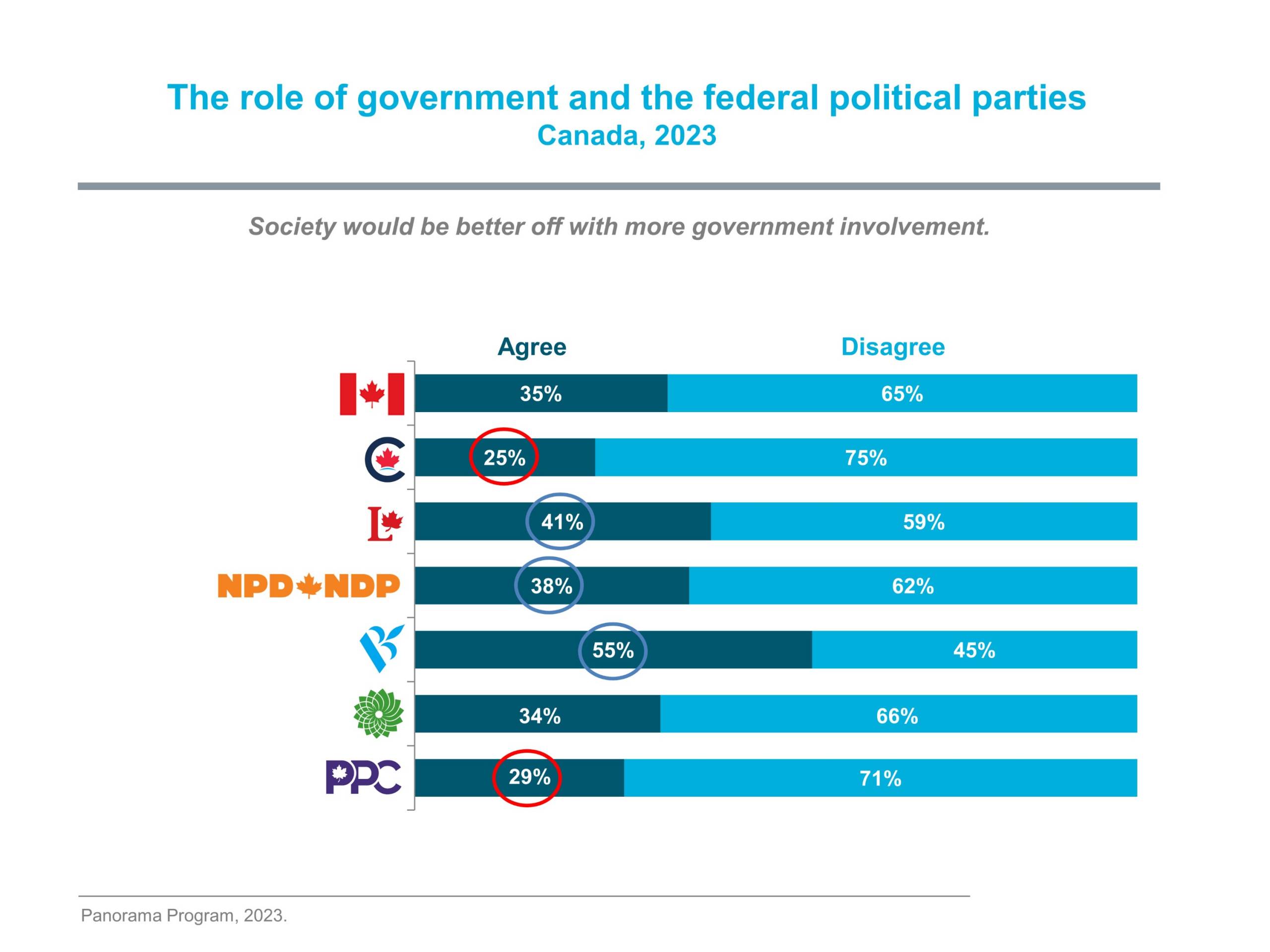
It is interesting to note that, for all federal political parties, a majority of voters oppose a more interventionist role for the State, with the exception of the Bloc Québécois: 55% versus 25% for the Conservatives – a 30-point difference. The Bloc clearly expresses Québec’s "distinctiveness," which is more progressive, humanist and social-democratic.
Whereas Conservative voters display the least support for this statement, clearly expressing their deep identification with a conservative philosophy.
Conservatism in its purest form
Fundamentally, conservatism opposes State intervention in society, in the belief that society obeys natural or even divine laws, which cannot and should not be manipulated by government. According to this view, Man should not interfere with this ontological design!
Moreover, this view aligns with another trend that characterizes Canadian society, one we call Social Darwinism. The idea that, in society, individuals behave and should behave like the models we find in nature (survival of the fittest).
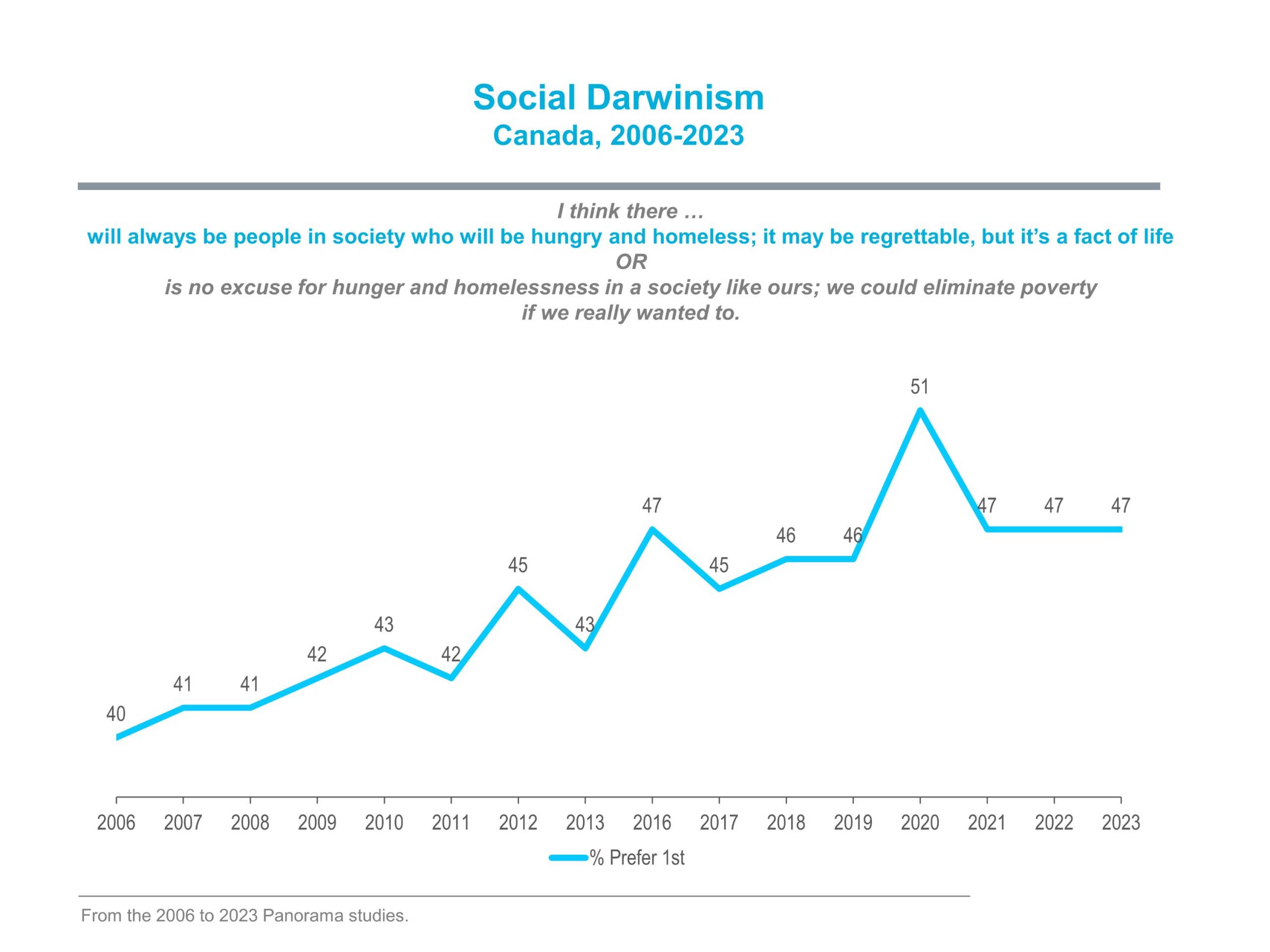
This trend expresses the rise of a certain fatalism in society, which goes hand in hand with the feeling of a loss of control over our lives.
It’s as if the world we live in now is fatally distancing us from the social democratic and progressive ideals that animated the country not so long ago. And above all, that there is nothing we can do about it: society, the world, and life are simply evolving this way!
Note that 2020 is a bit of an exception to the overall trend. The onset of the pandemic left people with the impression that, in this situation, you couldn’t save everyone. Which is, in fact, the spirit of this trend, but it was exacerbated by the outbreak of COVID-19 in 2020.
Again, conservatism is presenting itself as the legitimate expression of this Darwinist trend.
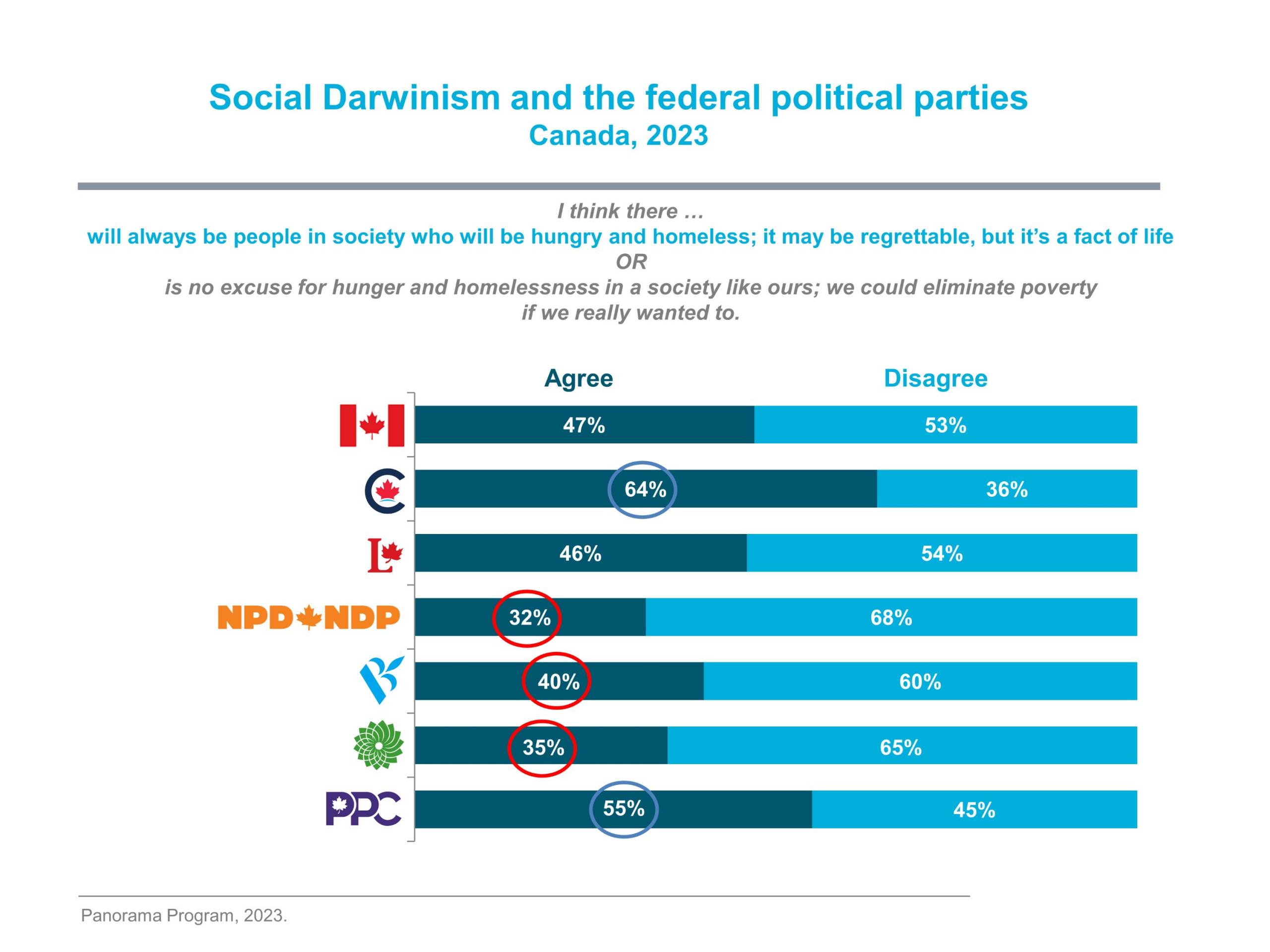
Conservative Party voters are the most likely to support our Darwinist statement (64%), while the New Democrats are the most opposed to it (32%), faithful to their humanist tradition.
Conservatism and immigration
Immigration, particularly at the current rate, will profoundly transform the social fabric of the country in the coming years. Indeed, this is already well underway: 20% of the Canadian population were not born in Canada, and 50% of Canadians (one in two) have an ethnic origin other than British or French.
However, many Canadians are offended by this transformation of the Canadian social fabric due to immigration, as illustrated by the following graph:
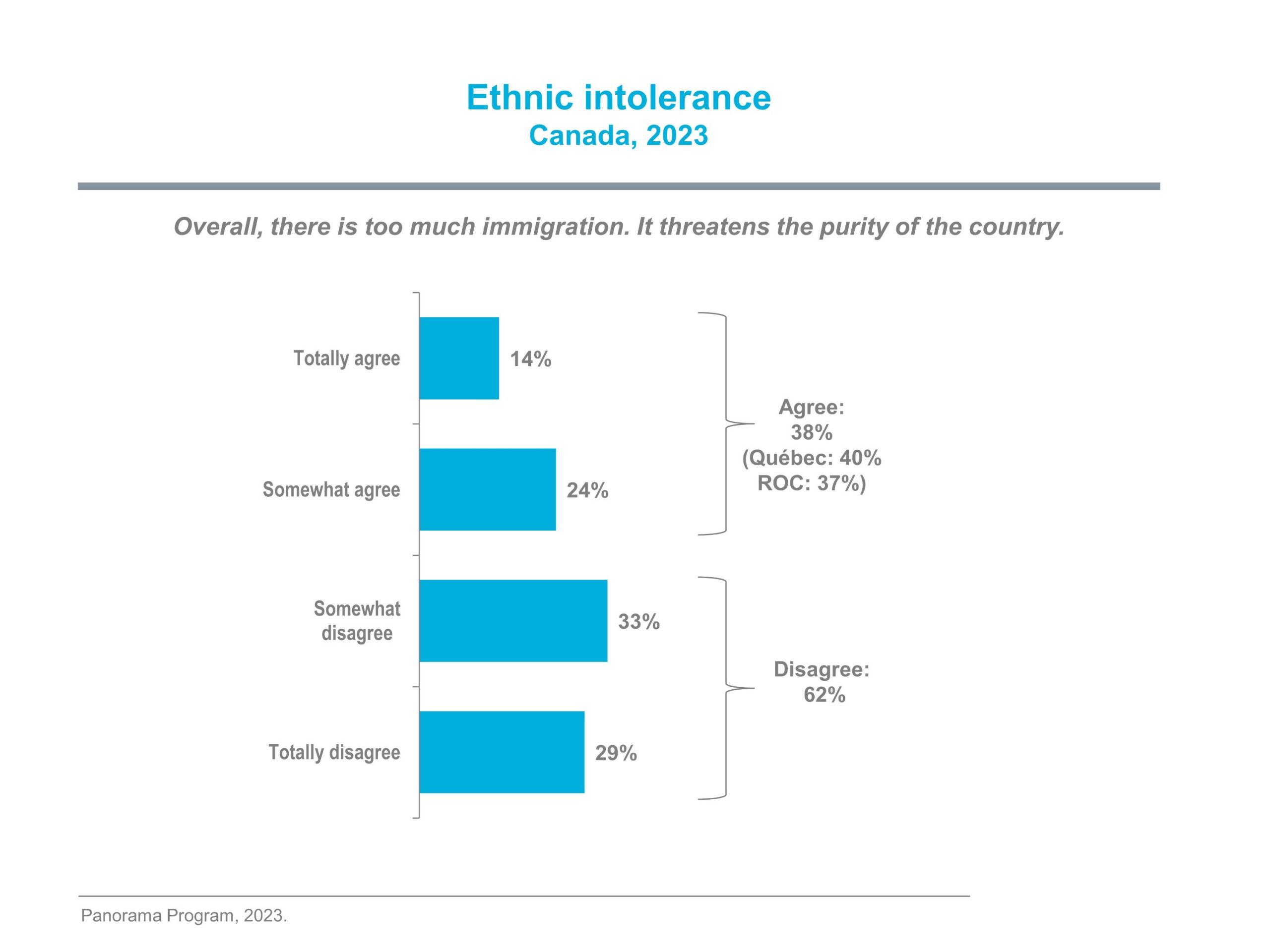
For many, immigration is seen as a threat to our cultural integrity and identity, which many politicians have exploited in very demagogic ways over the years.
Immigration is perceived by many as a sign that our society is changing too quickly, becoming a society in which they no longer recognize themselves.
However, given that conservatism is by definition opposed to change, immigration is undoubtedly an irritant for conservatives, as the following table illustrates:
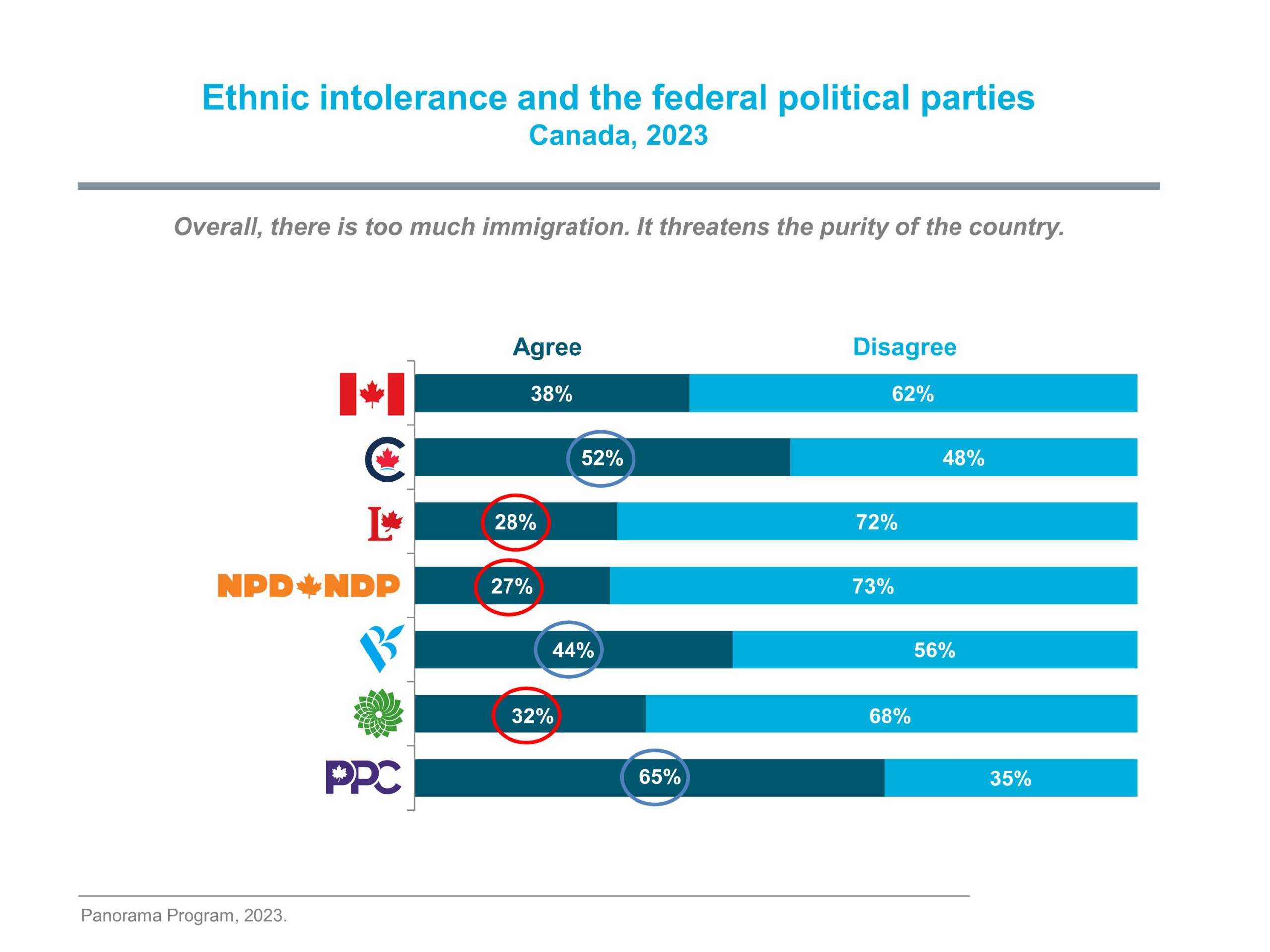
The difference between the Conservatives and the Liberals and the NDP is striking (the Conservatives are 24 points ahead of the Liberals and 25 points ahead of the NDP) – reflecting the contrast between the protection of a traditional Canadian identity and a Liberal multiculturalism and an NDP humanism.
And let’s not forget the Québecois specificity of the Bloc (44%), which takes its lead from the politics in Québec, which are fundamentally focused on the protection of language and identity (which has replaced the debate on sovereignty).
The new socio-political relevance of the Conservative Party of Canada
Thus, we have witnessed a rise in:
cynicism among the population
a feeling of lack of control over their lives
the perception that current governments and elites are responsible for this feeling of disempowerment
the notion that society is changing too fast, making it is difficult to keep up.
These are all phenomena increasingly characteristic of Canadian society and the wave on which the CPC is successfully riding!
In fact, we have seen these trends manifest in the Conservative Party for a number of years.
But for any political movement in the world to gain traction, its leader must know how to embody its spirit, its DNA, its values.
A leader who knows how to speak to people with emotion and relevance, who knows how to push their hot buttons.
The Conservatives have found this leader in Mr. Poilievre, who epitomizes all the trends characteristic of a large and growing segment of the country's population. He brings them to life, and with passion (which is interesting for an English Canadian from Calgary!).
In such a context, a Conservative majority government in Ottawa seems to be quite a realistic scenario to us…
With all due respect to the heirs of the Laurentian elite who have shaped the country since the 1960s and all the progressives who may have to bide their time for several years to come!
Note, however, that this thesis is based on surveys and sometimes, just like the weather, life can keep surprising us – especially since there are no plans for a federal election in the near future.